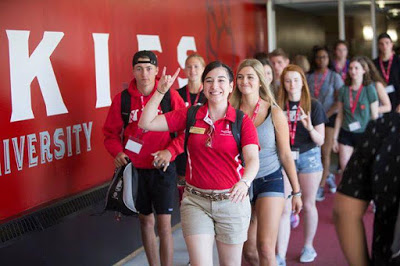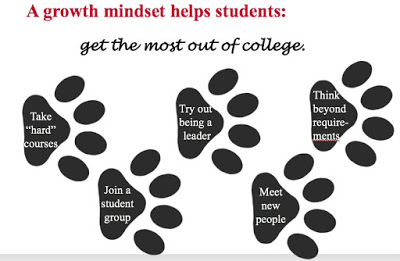The Growth Mindset is presented during the first day of our two-day orientation. It’s the second presentation after the welcome, when students have temporarily left their parent to start their program. It is presented by Amanda Durik a psychology professor at Northern Illinois University who has done extensive research on this concept.
Students with a growth mindset (i.e., who believe that abilities can change with effort; Dweck & Leggett, 1988) compared with those with a fixed mindset (i.e., who believe that abilities do not change) are poised to get more out of college because they are less afraid of challenges and more likely to persist through struggle. This session provides an overview of strategies parents and family members can use to help put students on the path to success by cultivating a growth mindset.
As part of the session, parents and family members are asked to write a letter to their student about a time that the student struggled (or they struggled as a family), and what they did to get through this adversity. They are then asked to seal those letters and provide the addresses of their student.
The letters are then sent to the students who live on or off-campus around midterm time of the fall semester. The residential staff (e.g., Complex coordinators and Residential Hall directors) then set-up meetings with those students whose parents wrote letters to talk about their reactions and their thoughts.
Although we do not have systematic data on the effectiveness of this particular program, anecdotally, both family members and students find the exercise meaningful. Correlational data suggest that, among NIU students who reported struggling in their courses, those with a growth versus fixed mindset were more likely to return to the university. This supports that students with a growth mindset are not so quick to give up when they experience adversity with their education and is consistent with other research showing that students who either report a growth mindset or who are taught about growth mindset are more likely to adaptively cope with adversity and persist through difficulty (Burnette, O’Boyle, VanEpps, Pollack, & Finkel, 2013).


Tips:
This program is successful because of the coordination between multiple offices on campus. It is encouraged that you work with your Housing and IT support team in order to figure out the most efficient way to distribute the letters. NIU Housing staff appreciated the information we provided for them early on about the presentation explaining Growth Mindset to families. It is helpful to first present the concept of what Growth Mindset is to your orientation staff and residential life staff so that they may better understand the concept and how to support the students when they have questions.
Another consideration is to have a plan in action for those students whose parents or family members did not participate in Family Orientation. Family Orientation is not required, so we do get quite a few students who don’t receive a letter and cannot participate in the exercise. We are currently in the process of discussing how we can better involve those students who don’t have parents and family members present, and how the Complex Coordinators and resident hall directors can assist with this process.
There is an article in our Winter Edition of the Family Connections magazineabout Cultivating Growth Mindset in Year Two.
Burnette, J. L., O’Boyle, E. H., VanEpps, E. M., Pollack, J. M., & Finkel, E. J. (2013). Mind-sets matter: A meta-analytic review of implicit theories and self-regulation. Psychological Bulletin, 139, 655-701. DOI: 10.1037/a0029531




